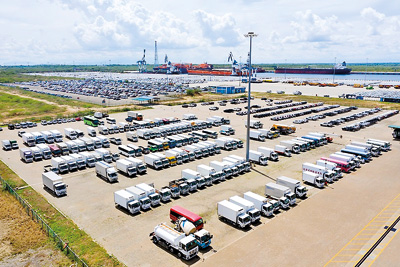Surviving the vehicle import ban
The objective of this article is to outline a strategy of how the Franchise Holder (FH) can cope with the motor vehicle import ban. The FH is the local agent of the automotive manufacturer in Sri Lanka and is distinct from the Parallel Importer (PI), who buys vehicles in the retail market abroad and imports the car to Sri Lanka. Typically, the PI’s vehicles are not covered by the manufacturer’s warranty, safety and recall actions, and software updates released from time to time by the manufacturer.

File picture of vehicles lying uncleared at Hambantota port in April 2020
The Secretary to the President has made the Government position abundantly clear to the industry. That is, the Government does not have the liquidity to fund motor vehicle imports and they feel that there is adequate stock on the ground for the next two years.
What can Franchise Holders do?
The FH has a challenge of covering his operational costs on the revenue earned from the after sales service business. Given below are strategies that FH’s could follow towards this end;
1. Maximising After Sales Service revenue
- Aggressively reduce price of fast moving parts.
- Marketing extended warranty schemes so vehicle owners can make a payment to extend their warranty. This covers the owner from unbudgeted expenditure, and gives the FH a revenue flow.
- Convert workshops to operate on 24/7 basis, so there is an increased throughput for the existing level of investment.
2. Negotiate with Principals
- Freeze Capital Expenditure requirements.
- Negotiate target based and model based discounts on spare parts.
3. Build brand
- The present period is a vacuum in the automotive industry and the ideal period to engage in customer-brand activation. This activation will promote the brand’s top of mind recall and also customer loyalty. It is an opportune time to invest in the development of customer relationships.
4. Keep employees motivated and active
- Ensure employees can earn a living wage.
- Restructure employee benefits
- Shift part of salary to be Key Performance Indicator (KPI) based, ensuring KPI’s are transparent and achievable.
What can the Government do?
The Government’s primary objective is to minimise the expenditure of foreign exchange. The Secretary to the President quoted the figure of US$ 1 billion spent on vehicle imports in 2019. The Government also spends around $3 billion on the import of fuel for transportation. Their broader objectives are to reduce the prevalent levels of congestion and pollution in main cities.
Strategies the Government could look at are;
- Use the period of the import ban to legislate the adoption of the EU 6 emission standard. The present standard that is applicable is EU 4, and the EU 6 standard ensures less exhaust gas pollution of the environment.
- When the import ban is lifted, to incentivise the import of electric vehicles, rather than vehicles with internal combustion engines (ICE)
- Encourage a reduction in private vehicles coming into cities by building parking facilities at city entry points, levying city entry charges, limiting parking within the city and finally ensuring the availability and quality of public transport within the city.
- Promote mobility platforms and mobility services that make more efficient use of transport hardware.
Conclusion
Pollution, congestion and high expenditure of fuel for transport were problems grappling the Sri Lankan government, prior to the COVID-19. The reduction in export income led the government to take the drastic decision to ban a selection of imports, including the import of motor vehicles. This decision can give the government time to take considered long term policy decisions that enhance the structure of mobility in Sri Lanka and bring permanent solutions to the problems of pollution, congestion and high expenditure on fuel for transport.
(The writer is Co-Founder of Innosolve Lanka (Pvt.) Ltd, a start-up dedicated to introducing sustainable mobility solutions in Sri Lanka).


